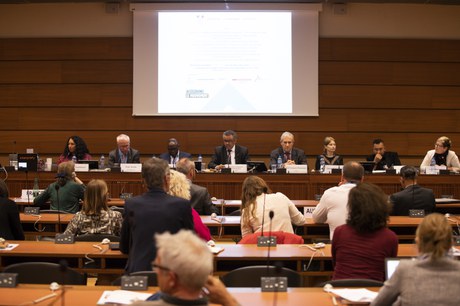The panel was organised by The Global Fund, Aidsfonds, Medicus Mundi Switzerland, Groupe Sida Genève, GNP+, IPPF, EGPAF and sponsored by the French government in the run up to the World Health Assembly in May 2019 in Geneva. France will host the Global Fund's sixth replenishment conference in October and has also been active in championing the human rights of key and vulnerable populations at the Global Fund. Ambassador François Rivasseau, Permanent Representative of the Mission of France to the United Nations, expressed the government's strong commitment to these efforts. He also noted the importance of ensuring the maximum impact for every dollar invested, and of strengthening efficiency and coordination in global health. Civil society advocates have called for a significant increase in funding of $16 billion for the Global Fund, in order to meet the Sustainable Development Goal of ending HIV, TB and malaria by 2030.
The panel brought together Dr. Tedros Adhanom Ghebreyesus, Director-General of the World Health Organization (WHO), ambassadors, and global health champions from the public sector and civil society. They argued forcefully that expanding universal health coverage will only be successful if it works with and for those most marginalised, criminalised and impoverished. In the words of Erika Castellanos, director of programs for Global Network for Trans Equality (GATE), countries may have "an amazing facility, but no one will go there" if the basic groundwork has not been done to understand and meet community health needs with innovative programming.
"We appreciate the narrative in the Sustainable Development Goals about leaving no one behind," agreed Rico Gustav, executive director of the Global Network of People Living with HIV (GNP+). “However, communities most affected by HIV were never there in the first place. This is because key populations, including men who have sex with men, sex workers, transgender people and people who use drugs face widespread violence, stigma and discrimination, including in the health sector."
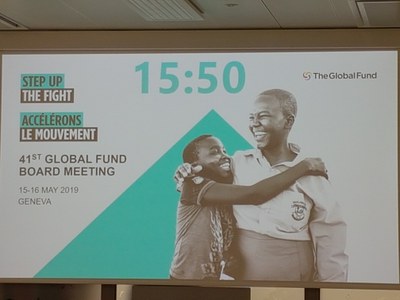
41th Global Fund Board Meeting 15 to 16 May 201. Photo: © Carine Weiss, MMS
Lessons learned from Global Fund
In exploring what lessons could be learned from the Global Fund's experience, the panelists touched on three key areas: the importance of embracing health as a human right; the role of the Global Fund's investments in contributing to building stronger health and community systems and in promoting the rights of key populations, women and girls; and the central role communities have played in planning, implementing and evaluating HIV programmes.
Embracing health as a human right
Dr. Tedros opened by strongly affirming that health is a fundamental human right. Making that human rights commitment, he said, enables countries to take deliberate steps to fulfill the right to health for all: "Countries that have embraced health as a human right have been able to progress UHC." He noted that half of the world's population lacks access to essential health services; 100 million people descend into poverty each year due to out-of-pocket payments for health services. When catastrophes strike, "it's the marginalized who are most affected."
Dr. Cleopa Kilonzu Mailu, Ambassador and Permanent Representative of the Mission of the Republic of Kenya to the United Nations, agreed that because Kenya's national constitution upholds the human right to health, the government has been mandated to use UHC to expand access to health services. He said this had been done by eliminating user fees and expanding financial protections for poor and marginalised populations, especially women and children. Dr. Tedros echoed community activists on the panel: "The point of health for all is that everyone must be included: migrants, rural populations, people in prison, the LGBT community, sex workers, drug users, poor people."
As other participants said: countries need to move from a passive to a pro-active approach towards UHC, and take deliberate steps in law, policy, data and community engagement to ensure the most marginalised and vulnerable benefit from UHC. Countries must reach zero stigma and discrimination in health care settings, and factor in human rights interventions to ensure health programs are effective and reach the most marginalised.
Building stronger health and community systems
The panelists agreed that, despite perceptions to the contrary, the Global Fund's investments in HIV, TB and malaria had actually been critical to building strong health systems. Ambassador Mailu said that in Kenya, the Global Fund "helped us to build strong supply chains, access quality medicines, and other health systems which we can now leverage for broader health coverage." Similarly, Dr. Tedros remembered that in Ethiopia, primary health care had been built in part with treatment and care systems that were first put in place by the Global Fund.
Peter Sands, executive director of the Global Fund, said that he had seen this happen again and again in his visits to many countries: "If you want to beat the three biggest diseases, you have to build health systems. And even if your focus is purely on the health system, any system that doesn't get on top of the three diseases won't be able to provide the other services people need." Twenty-seven percent of Global Fund investments are dedicated to building resilient and sustainable systems for health, he noted.
Along these lines, Sands said that the Global Fund could not do it alone: countries also need to step up their domestic financial contributions. The Global Fund has catalysed $7.9 billion additional domestic financing for health during 2017-19, a 42 percent increase over the previous funding cycle. While most low-income and low-middle-income countries have committed to UHC on paper, he said, many do not contribute as much as they could. Dr. Tedros agreed, reminding African Union member states of their pledge in the 2001 Abuja Declaration to allocate 15% of their budgets to health.
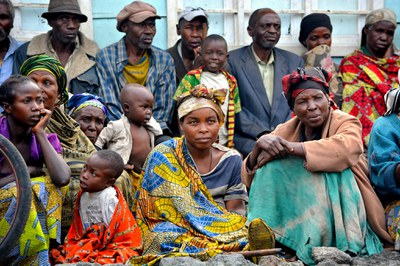
Joint UN-AU High Level Delegation Visits IDP Camp in DRC. Photo: © UN Women/flickr, CC BY-NC-ND 2.0
Financing community-led responses
In financing an effective response, panelists emphasised that it is essential to recognise and support the full diversity of human resources required for community-based and led responses for health, extending beyond Community Health Workers to include a wide range of community implementers, stakeholders and partners.
Organisers expect to see an unambiguous and strong commitment to community-led and based responses as part of the prioritisation of primary health care, achievement of UHC and acceleration of progress across all of the SDGs. For instance, the Free Space Process and the PITCH programme called on WHA member states at the WHA72 to resource community-based and led responses for health through fair and sustainable national financing for primary health care and UHC, combined with on-going donor support to fill strategic gaps.
The panelists emphasised the uniquely inclusive and democratic governance system of the Global Fund as key to its success. Gustav said that for UHC to be effective, key populations must be included in national and global health governance as not only beneficiaries, but also as leading actors who plan, implement and evaluate health programmes. As they are close to the ground, community-led responses are well-positioned to sound the alarm if programmes are performing poorly, so that courses can be corrected in real time. Community-led responses can also help to reach criminalised and hidden populations that the formal health sector fails to reach, he said.
However, Gustav cautioned, key populations-led advocacy cannot be done for free: "While communities are committed and passionate, this work needs to be supported financially." He praised the Global Fund as one of the few aid agencies to invest in community systems. "We have proven that when there are proper investments in both government and civil society systems, and there's a facilitation process to bridge these two, it's a more sustainable investment. It opens up the doors -- other things can happen."
Ms. Oxana Rucsineanu, Vice President and Program Director of the Moldovan National Association of TB Patients (SMIT), described her experience of this first-hand, and of surviving the harsh treatment regimen for multi-drug-resistant tuberculosis (MDR-TB). She noted that just over half of MDR-TB patients recover, because most lack treatment access, and that like HIV, TB also has key populations: "The most vulnerable are people living with HIV, people who inject drugs, migrants, mobile populations, indigenous people, miners, and people in poverty." People with TB need to not only tell their stories in public panels like this one, she said: "We need to build a strong TB community and movement. We need community people to be able to participate in the planning, building and monitoring." She noted that Stop TB Partnership and TB People were advancing this work by launching the Declaration of the Rights of People Affected by Tuberculosis.
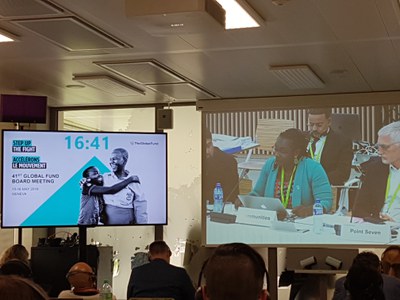
41th Global Fund Board Meeting 15 to 16 May 201. Photo: © Carine Weiss, MMS
Sands concurred that the integration of people living with and affected by HIV, TB and malaria in the Board and in programme implementation is part of what makes the Fund's unique model work. For this reason, the Global Fund strongly encourages countries preparing to transition out of Global Fund financing to develop social contracting mechanisms.
Castellanos cautioned that these transitions are risky moments for communities: the chief platforms for collaboration at the national level, the multi-stakeholder oversight committees known as Country Coordinating Mechanisms (CCMs), are sometimes abandoned when the Global Fund ends funding in middle-income countries. She called for countries to keep a role for CCMs when they shift to UHC.
All the panelists underscored the fragility of the gains to date. Rucsineanu said that when her organization helps people with TB to access treatment, "You can see the expression in their eyes changing from despair to hope. We can't stop now." Sands warned, "There isn't a middle ground, steady-as-you-go solution with the three diseases: you're either winning or you are losing." He called for a $14 billion replenishment for the Global Fund as the minimum needed to step up the fight against the three diseases and progress towards UHC.
What is next?
We hope this discussion and strong statements support the call from civil society around the world to invest in the Global Fund, and achieve the civil society request of USD 16 billion for the sixth Replenishment. We also hope this discussion informs and supports the negotiations on the Zero Draft of the Political Declaration of the UN High Level Meeting on UHC, by a) reaffirming a rights-based approach in delivering health for all, b) recognising the critical role of communities in the design and implementation of UHC, and c) Reaffirming international solidarity and international funding commitments for UHC.
Making universal health coverage work for key, vulnerable and underserved populations: The role of the Global Fund to Fight AIDS, TB and Malaria took place in Geneva in the Palais des Nations on 7 May 2019. It was sponsored by the Permanent Mission of France to the United Nations Office and GNP+, as well as other international organisations in Switzerland, including: Aidsfonds, the Global Fund, the Elizabeth Glaser Pediatric AIDS Foundation, Groupe Sida Genève, International Planned Parenthood Federation (IPPF), Medicus Mundi Schweiz, and the Partnership to Inspire, Transform and Connect the HIV Response (PITCH).
This article for the newsletter is based on the blog published in the Human Rights and Health Journal last May 23, 2019.
Authors
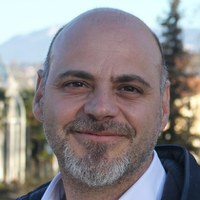
David Ruiz Villafranca is the Geneva Representative of Aidsfonds. He works closely to Geneva actors to ensure HIV, key and vulnerable populations related issues remain in the top of the global health and human rights agenda. He is Pharmacist and has more than 10 years’ experience working on HIV, health and human rights internationally. He previously worked with the United Nations System in Latin America and the Caribbean region. Email
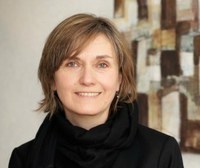
Sara L.M. Davis (known as Meg) is an anthropologist and human rights activist, and a senior fellow at the Graduate Institute’s Global Health Centre and Anthropology & Sociology department.
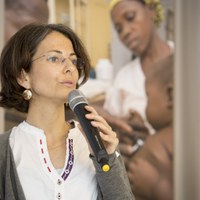
 Carine Weiss, Projectmanager, Medicus Mundi Switzerland
Carine Weiss, Projectmanager, Medicus Mundi Switzerland
